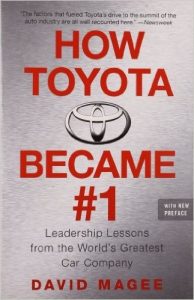This is part of an ongoing series of organizational and personal improvement book reviews. If you have read the book already, then use this as a reminder of key lessons. If you have not read the book and are looking to learn and grow as a leader, then this summary is for you! In short, will share some of our favorite quotes and leadership lessons from Toyota.
 Lean East recently read How Toyota Became #1: Leadership Lessons from the World’s Greatest Car Company, a book by journalist David Magee published in 2008. The book was written to review the history of Toyota’s growth from a Japanese start-up to the largest automobile manufacturer in the world.
Lean East recently read How Toyota Became #1: Leadership Lessons from the World’s Greatest Car Company, a book by journalist David Magee published in 2008. The book was written to review the history of Toyota’s growth from a Japanese start-up to the largest automobile manufacturer in the world.
First, Magee interviewed many of Toyota’s senior executives to write the book and in doing so became amazed at the differences between Toyota and the other auto companies. During his research, he realized that instead of a history book he needed to write a book that shared their leadership lessons.
In short, this summary focuses on leadership quotes selected from interviews. Feel free to reuse any of these great lessons on your Lean journey.
Our Favorite Leadership Quotes:
“The ideal conditions for making things are created when machines, facilities, and people work together to add value without generating any waste.” – Kiichiro Toyoda, son of Toyota’s founder
“People try to adapt parts of [the Toyota Production System or (TPS)], and they find it is not a panacea. [TPS] is like software. It takes years to develop through patience and experience.” – Dennis Cuneo, advisor and former Toyota Motor North America executive
“The Toyota system is teaching people to think [for] themselves and find a better way to do the job . . . to take individual ownership.” – Dennis Cuneo
“We believe that human beings should have infinite possibilities to explore. In the United States and Europe most employees have descriptions which are limiting. Employees are encouraged to go beyond [them]. We have job descriptions, too, but for guidance. Employees are encouraged to go beyond [their job descriptions] and be creative. We want to create infinite possibilities.” – Mitsuo Kinoshita, Toyota’s executive vice president in charge of global human resources
Taiichi Ohno:
About long-time Toyota employee and executive vice president Taiichi Ohno coaching Teruyuki Minoura, retired president and CEO of Toyota Motor Manufacturing North America: “Ohno drew a circle on the floor in the middle of a congested area in a production facility and told him to stand in it for hours. Viewing the bustling activity immediately around him while standing in isolation forced Minoura to ask probing questions about what he had previously viewed as business as usual: Why does that worker walk eight steps when only four are needed? Why do parts arrive before the worker needs them?”
“Something is wrong if workers do not look around each day, find things that are tedious or boring, and then rewrite the procedures. Even last month’s manual should be out of date.” – Taiichi Ohno, former Toyota executive vice president
Jim Press:
“Our goal isn’t to sell more cars. Our goal is to give our customers more quality. If we do a good job, our sales will go up . . . but our goal is not higher sales and profits. We work for the customers. We strive to give them peace of mind.” – Jim Press, former president, Toyota Motor North America
“You don’t learn from success; mistakes are what shape us. We treasure mistakes.” – Jim Press
Katsuaki Watanabe:
“Toyota’s quality has made us what we are today, so we can’t afford to let it slip. I believe it is vital that we faithfully hold on to our belief that no growth can come without improving quality.” – Katsuaki Watanabe, president, Toyota Motor Corporation
“Problems must be made visible. Early detection and resolution is the key, and I’m telling [Toyota] people not to hesitate to recall. That’s very important for customers. Rather than extending the period before a recall, or thinking the problem isn’t serious enough, the most important thing is to try to service those cars and correct difficulties early on.” – Katsuaki Watanabe
Koki Konishi:
“Toyota executives are 100 percent interested in human resource development. They believe it is their job . . . not their responsibility, but their fate . . . the fate of the company.” – Koki Konishi,
“At Toyota, a doing person is all that is needed. It does not matter who they are, or where they are. We don’t need geniuses. We need people willing to question, question, question. Once they find out the root cause of a problem, do it, immediately. Then disseminate and share.” – Koki Konishi, Director of the Toyota Institute
Mitsuo Kinoshita:
“We want to have an environment where the supervisor teaches. We cannot do in each environment exactly what we want to do, and we have to adapt. But, this culture of teaching and being taught is important to Toyota. The principle remains the same wherever we are.” – Mitsuo Kinoshita
“If employees just did what they were told to do, you would continually find defects at the end of the line. We want employees to go beyond what they are told and be creative, building quality into the processes.” – Mitsuo Kinoshita
Others:
“I do not watch the stock price. If I did, I might make bad decisions for the company.” – Dr. Shoichiro Toyoda, Toyota director, and honorary chairman
“On our board of directors . . . there is not a lot of homocentric thinking. It is not about opinion. Decisions are fact-based . . . go and see and obtain a deep understanding. Then we expose weaknesses. At some point, visionary leaders have to sign off on it, but everyone is challenged to find the answers. I have never left a meeting with [fellow Toyota executives and board members] without them challenging me to improve and take this company to the next level.” – Gary Convis, executive and original NUMMI plant manager
“For Americans and anyone, it can be a shock to the system to be actually expected to make problems visible. Other corporate environments tend to hide problems from bosses.” – Latondra Newton, employee at Toyota Motor Engineering & Manufacturing
Mitsuo Kinoshita shares keys to supplier relations:
“The foundation of Toyota relationships:
- Establish mutual trust.
- Mutually improve productivity and share the benefits.
- Mutually contribute to the betterment of society and economy.”
“The true measurement . . . is not what you have taken, but [what you have] given in return; the same thing goes for a company. We reinvest in America or wherever we are and try to help those who cannot help themselves.” – Jim Press
“I fear that being successful may make us arrogant and want to stay in a comfort zone. That is the threat.” – Katsuaki Watanabe
“Everyone should be dissatisfied with the present situation and should constantly try to improve or change things. It’s important to realize that these is always something more we need to aim at. That’s ‘what needs to be recognized by every individual. When you’re growing, you’re satisfied with the status quo, and that’s no good.” – Katsuaki Watanabe
Toyota’s formula for excellence shared by Jim press:
- Maintain strong principles
- Constantly change
- Don’t believe the headlines along the way
Jim Press says, “Doing the right thing at the office each day requires little more than asking simple questions:
- How can we best serve customers?
- What is our impact on the environment?”
- How fulfilled are employees?
- How are we contributing to quality of life?
“For us to become the genuine number one – in quality – we have to realize the dream vehicle which makes the air cleaner, never injures people, makes people healthier, and can run on a single tank of fuel between London to Istanbul.” – Katsuaki Watanabe
Our team hopes you enjoyed these leadership lessons from Toyota. Overall, these quotes were inspiring to hear from a great company with similarly true leaders! If you enjoyed this post, then you may also want to check out our post about the Toyota Way.
When you share or repost this summary, please post with your favorite leadership quote.


Related Posts
Is Your Organization High-Performing? Take Our FREE Performance Assessment
The God Complex: Why We’re All Making This One Mistake
How I am Changing the Career Advice I Give My Kids